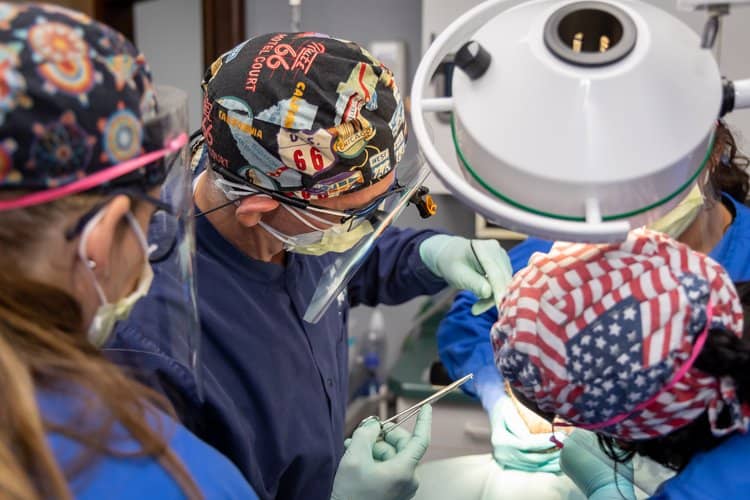Embracing a Drug-Free Approach:
The Role of Dentistry in Opioid-Free Practices

The ongoing opioid crisis has cast a shadow over the entire healthcare landscape, prompting a reassessment of prescribing practices across various medical fields, including dentistry.
Dental professionals play a crucial role in the broader healthcare system, and their significance in addressing the opioid crisis cannot be overstated. It is imperative for dentistry to adopt opioid-free practices. Evaluating alternative pain management strategies underscores the benefits we can offer to both patients and the community.
The Opioid Crisis in Dentistry
Dentistry has traditionally relied on opioids for pain management, especially following invasive procedures. This has been the standard approach in teaching and practice for decades.
However, the opioid crisis has drawn attention to the potential risks associated with the overprescription of these drugs. While opioids effectively alleviate pain, they also present a significant risk of addiction, abuse, and adverse side effects.
Recognizing this, dentists are increasingly exploring alternative methods to manage pain, aiming to minimize potential harm to patients.
Alternative Pain Management Strategies
Several alternatives exist, including:
- Non-Opioid Analgesics
Embracing non-opioid analgesics is a fundamental step towards opioid-free dentistry. Nonsteroidal anti-inflammatory drugs (NSAIDs), such as ibuprofen, prove effective in managing dental pain and inflammation. These medications target the source of pain without the addictive properties associated with opioids. (See the 2018 Case Western Reserve University study indicating that, “ibuprofen and other nonsteroidal anti-inflammatory drugs (NSAIDs) alone or in combination with acetaminophen are better at easing dental pain than opioids.”)
- Local Anesthetics
Dentists are experts in the use of local anesthetics to provide targeted pain relief during dental procedures. These drugs temporarily block nerve signals in a specific area, ensuring that patients remain comfortable during treatment. The recent introduction of longer-acting local anesthesia has greatly reduced the need for post-surgical opioids.
- Cognitive-Behavioral Techniques
Integrating cognitive-behavioral techniques can help manage pain perception. Dentists can employ relaxation methods, distraction techniques, and mindfulness practices to alleviate anxiety and pain, reducing the reliance on pharmacological interventions.
- Preventive Approaches
Adopting preventive strategies can minimize the need for postoperative pain management. General dentists play a pivotal role in patient education on oral health, encouraging regular check-ups, and promoting early intervention to prevent the progression of dental issues, reducing the likelihood of intense pain requiring opioids.
Benefits of Opioid-Free Dentistry
There are many benefits to these opioid-free pain management strategies:
- Reduced Risk of Addiction
Opioid-free dentistry contributes to the broader effort to curb opioid addiction. By minimizing exposure to these potent drugs, dental professionals play a crucial role in preventing the development of substance use disorders.
- Enhanced Patient Safety
Non-opioid alternatives often have a more favorable safety profile, reducing the likelihood of adverse reactions and complications. This enhances patient safety and overall satisfaction with dental care.
- Community Well-Being
Opioid-free dentistry aligns with public health goals by promoting community well-being. It fosters a culture of responsible pain management and contributes to the reduction of opioid-related harm in society.
Shift Toward Opioid-Free Dentistry
The shift towards opioid-free dentistry is a vital and responsible evolution in dental care. By embracing alternative pain management strategies, dentists can prioritize patient safety, contribute to the mitigation of the opioid crisis, and foster a healthier community. The ongoing commitment to research, education, and the implementation of innovative approaches will empower dentists to provide effective and compassionate care while minimizing the risks associated with opioid use.
I invite you to join my mission to help reduce the opioid crisis via dentistry. Examine your practice and consider what is needed and best for your patients, rather than simply following traditional practices.
ABOUT THE AUTHOR
Dr. James Babiuk, also known as TheWisdomToothDoc, is the founder of The Centre for Oral Surgery in Joliet, Illinois, (https://wisdomteethjoliet.com), an international speaker and the author of, “What Every Parent of an Adolescent Needs to Know About Opioids.”
A graduate of Northwestern University, Dr. Babiuk taught oral surgery and outpatient anesthesia to residents in training at Cook County/Stroger Hospital in Chicago and has been in practice for over 25 years with 29-plus years of anesthesia experience and well over 234,737 teeth extractions.
He is known for holistic oral surgery, focusing on all aspects of the patient and going above and beyond to exceed their unique needs.











